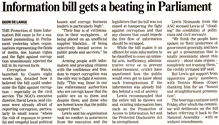|
Getting your Trinity Audio player ready...
|
 The Protection of State Information Bill came in for a sustained pummelling in Parliament yesterday when organisations representing the fields of media, law, human rights and the fight against corruption unanimously rejected the bill in its current form.
The Protection of State Information Bill came in for a sustained pummelling in Parliament yesterday when organisations representing the fields of media, law, human rights and the fight against corruption unanimously rejected the bill in its current form.
Corruption Watch, launched by Cosatu eight weeks ago, detailed how it believed the bill could undermine the fight against corruption – especially in the civil service. The NGO’s executive director, David Lewis, said citizens were already afraid of reporting corruption, particularly in small towns “where the risk of exposure to powerful and vengeful local political bosses and corrupt business leaders is particularly high”. “Their fear is of victimisation in their workplaces… of being placed on an unofficial supplier blacklist… of being selectively denied access to public goods and services,” he said.
Arming people with information and providing citizens with the confidence and freedom to report corruption was the only way to fight it successfully. “This way, those in our law enforcement authorities who are corrupt know that the public are on to them and despise them; and those who are honest know that the public support them.”
Lewis said his organisation took no comfort in assurances from the executive and the legislature that the bill was not aimed at hampering the fight against corruption and that any clauses that could impede the free flow of information should be scrapped.
While the bill makes it an offence for state information to be classified to cover up unlawful acts, inefficiency, administrative error or to prevent embarrassment, critics have questioned how the public would even get to know about such transgressions if the information was already hidden behind a veil of secrecy.
Lewis recommended that the entire bill be thrown out and existing infortnation laws such as the Promotion of Access to Information Act and the Protected Disclosures Act be strengthened.
Lewis Nzimande from the ANC accused Lewis of “clouding” the credibility of politicians and civil servants.
“We think the people have spoken on their preference of government generally, and here we get a presentation that is totally pessimistic about this country – about state organs – completely not trusting them,” the visibly irritated MP said.
But Lewis got support from opposition party members, with Dennis Bloem (Cope) thanking him for an “honest and straightforward presentation”. The hearings continue until Friday, after which the committee will deliberate on the bill before referring it back to the National Assembly – with or without amendments.
This article originally appeared in the Star on 28 March 2012.

The Protection of State Information Bill came in for a sustained pummelling in parliament when organisations representing the fields of media, law, human rights and the fight against corruption unanimously rejected the Bill in its current form, the Star reported.



